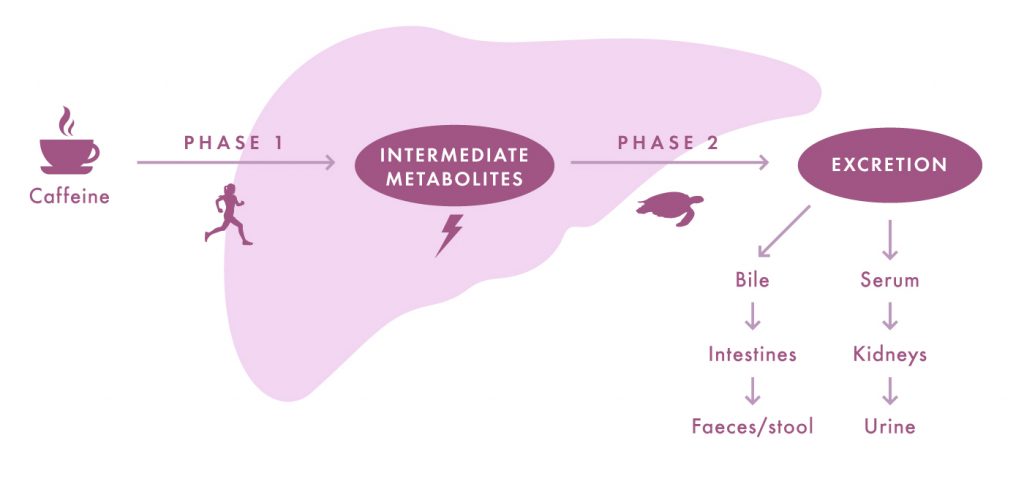Last updated on August 17th, 2021
Caffeine is the most widely consumed stimulant in the world, with roasted coffee beans and tea leaves being the primary source of dietary caffeine. It is also found in cocoa, chocolate, soft drinks, energy drinks, some medications and dietary supplements.
Some people notice they are caffeine sensitive while others will claim they can drink a strong black coffee after dinner and still sleep solidly for eight hours. This can, in part, be due to the way caffeine is metabolised and cleared from the body, which involves a number of variables such as gender, hormones, liver function, genetics, smoking, dietary intake and other lifestyle factors.
Let’s explore why some people tolerate caffeine better than others, and why others don’t tolerate it at all.
Liver overload
Caffeine is metabolised via the liver. Don’t be put off by this big, long name – an enzyme called Cytochrome P450 1A2 (CYP1A2) is the main enzyme responsible for this process. Fancy names aside, the point is, caffeine is a drug which requires detoxification via the liver so it can be safely eliminated from the body. Detoxification is a change process where the liver takes something, that if it accumulated inside you, would be harmful to you, and transforms it into a less harmful version, in preparation for elimination. There are two phases of detoxification in the liver and one in the gut.
A good way to imagine what happens with caffeine is that like other substances that the liver needs to deal with (alcohol, trans fats, refined sugars, synthetic substances, as well as substances made inside you like sex hormones, cholesterol, and metabolites from microbes), caffeine arrives at the front door of the liver needing to be changed (detoxified). Imagine the liver has roads through it: there are roads substances like caffeine can travel along into the liver that make up phase 1 detoxification and there are roads out of the liver, which are the pathways for phase 2 detoxification. Caffeine increases the speed of phase 1 liver detoxification. Great, you might think, sounds like just what I need—faster liver detoxification processes. But here’s the thing: for too many people today, their phase 2 is inefficient, congested or simply overwhelmed with its task list, so the substances travelling along a phase 2 pathway can be moving slowly, like traffic crawling along a motorway. And now you have sped up phase 1 with the caffeine.
So with fast phase 1 generating what are known as ‘intermediate metabolites’ that need to immediately be taken in by the phase 2 pathways to continue on their detoxification journey, if the phase 2 roads are congested with traffic, the products of the end of phase 1 have nowhere to go. This can have major consequences for your health and your body’s ability to prevent diseases as these intermediate metabolites that are only partially detoxified, are highly reactive and can damage your tissues.

To learn more about the phases on liver detoxification, please click here.
Genetics
Genetics also plays a role in the way our body functions, with caffeine metabolism being no exception. Research suggests genetic variations altering the activity of CYP1A2 determines how efficiently your body produces this enzyme, resulting in the metabolism of caffeine being either sped up or slowed down. This genetic variability suggests the amount of caffeine consumed can affect two individuals differently, depending on their genetic make-up.
This is a great example of why tuning into YOUR body and having a true understanding of how foods and beverages affect YOUR health as an individual is so very important.
Your adrenals need a holiday
Too many people in the Western world today regularly over-consume caffeine, they feel pressured about their work, money, relationships or their body, feel like all of their tasks are urgent, like there aren’t enough hours in the day, feeling as though whatever they do, it is never enough.
Many people have become so accustomed to living this way that they don’t even notice how stressed they are anymore. Anxiety is rife, yet most people who experience it are not aware that caffeine intake leads them to make the very hormone that drives anxious feelings. If you experience such feelings, caffeine needs to be the first thing that goes.
Bowel health
Are you relying on your morning cup of coffee to “keep your bowels regular”? Caffeine increases gut motility, the contraction of muscles that allow faeces to move through the digestive system. For some people, this simply results in consistent bowel motions while for others it promotes bowel emptying urgency and/or generally loose stools. Relying on caffeine to stimulate bowel movements however, can lead to a host of digestive system challenges as well as nutritional deficiencies. Caffeine blocks the absorption of numerous minerals including calcium, magnesium and zinc. Coffee and tea also contain tannins which inhibit iron absorption.
For tips on supporting your bowel health, click here.
Some signs and symptoms caffeine may not be benefiting your health:
- Your heart rate increases after consuming it
- You suffer from anxiety or have anxious feelings regularly
- Jittery hands
- Brain fog
- Muscle tension
- Magnesium deficiency
- Zinc deficiency
- Digestive upsets or loose stools
- Headaches
Some people’s health, energy, sleep, nutritional status, hormone balance and gut function are significantly better without caffeine. Yes, none. For others, their health parameters would improve if they consumed less caffeine. This might look like a single shot of coffee three days a week and away from food, instead of a double shot two to three times a day. Other people are fine with a coffee each day. Or perhaps tea doesn’t bring on any challenging symptoms, whereas coffee does. Start to notice how caffeine from any source leads you to feel and make choices that serve YOUR individual health needs.
Is it time you reassessed your caffeine intake?
Thanks for reading!
References
Nehling, Astrid; Alexander, Stephen P.H. (2018). Interindividual Differences in Caffeine Metabolsim and Factors Driving Caffeine Consumption. Pharmacological Reviews, 70(2), 384-411. doi: 10.1124/pr.117.014407
Denden, S.; Bouden, B.; Haj Khelil, A.; Ben Chibani, J.; Hamdaoui, M.H. (2016). Gender and ethnicity modify the association between the CYP1A2 rs762551 polymorphism and habitual coffee intake: evidence from a meta-analysis. Genetics and Molecular Research, 15(2), –. doi:10.4238/gmr.15027487
https://www.coffeeandhealth.org/topic-overview/caffeine-and-metabolism/









